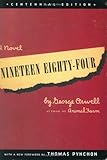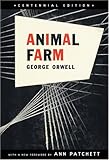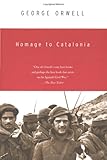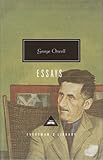|
|
Help |
| Home - Authors - Orwell George (Books) | |
e99 Online Shopping Mall
|
|
Help |
| Home - Authors - Orwell George (Books) | |
| 1-20 of 98 | Next 20 |
click price to see details click image to enlarge click link to go to the store
| 1. Nineteen Eighty-Four by George Orwell | |
 | Paperback: 368
Pages
(2003-05-06)
list price: US$15.95 -- used & new: US$8.97 (price subject to change: see help) Asin: 0452284236 Average Customer Review: Canada | United Kingdom | Germany | France | Japan |
|
Editorial Review Product Description Customer Reviews (1612)
| |
| 2. Finding George Orwell in Burma by Emma Larkin | |
 | Paperback: 304
Pages
(2006-03-06)
list price: US$15.00 -- used & new: US$8.39 (price subject to change: see help) Asin: 0143037110 Average Customer Review: Canada | United Kingdom | Germany | France | Japan |
|
Editorial Review Product Description Customer Reviews (40)
| |
| 3. Animal Farm: Centennial Edition by George Orwell | |
 | Paperback: 128
Pages
(2003-05-06)
list price: US$14.00 -- used & new: US$7.56 (price subject to change: see help) Asin: 0452284244 Average Customer Review: Canada | United Kingdom | Germany | France | Japan |
|
Editorial Review Product Description Customer Reviews (1258)
| |
| 4. A Collection of Essays by George Orwell | |
 | Paperback: 324
Pages
(1970-10-21)
list price: US$15.00 -- used & new: US$5.00 (price subject to change: see help) Asin: 0156186004 Average Customer Review: Canada | United Kingdom | Germany | France | Japan |
|
Editorial Review Product Description This essay alone would be worth the cover price, and the dozen other piecescollected here prove that, given the right thinker/writer, today'sjournalism actually can become tomorrow's literature. "The Art of DonaldMcGill," ostensibly an appreciation of the jokey, vaguely obsceneillustrated postcards beloved of the working classes, uses the lens ofpopular culture to examine the battle lines and rules of engagement in thewar of the sexes, circa 1941. "Politics and the English Language" is aprose working-out of Orwell's perceptions about the slippery relationshipof word and thought that becomes a key premise of 1984. "Looking Back onthe Spanish War" is as clear-eyed a veteran's memoir of the nature of waras you're likely to find, and Orwell's long ruminations on the wildlypopular "good bad" writers Charles Dickens and Rudyard Kipling showcase hissingular virtues--searing honesty and independent thinking. From Englishboarding schools to Gandhi's character to an early appreciation of HenryMiller's Tropic ofCancer, these pieces give an idiosyncratic tour of the first halfof the passing century in the company of an articulate and engaged guide. Don't let the idea that Orwell is an "important" writer put you off readinghim. He's really too good, and too human, to miss. --Joyce Thompson Customer Reviews (27)
| |
| 5. Animal Farm and 1984 by George Orwell | |
 | Hardcover: 400
Pages
(2003-06-01)
list price: US$24.00 -- used & new: US$14.62 (price subject to change: see help) Asin: 0151010269 Average Customer Review: Canada | United Kingdom | Germany | France | Japan |
|
Editorial Review Product Description Customer Reviews (41)
| |
| 6. All Art Is Propaganda by George Orwell, Keith Gessen | |
 | Paperback: 416
Pages
(2009-10-14)
list price: US$14.95 -- used & new: US$2.13 (price subject to change: see help) Asin: 0156033070 Average Customer Review: Canada | United Kingdom | Germany | France | Japan |
|
Editorial Review Product Description Customer Reviews (5)
| |
| 7. Nineteen Eighty-Four by George Orwell | |
 | Kindle Edition: 368
Pages
(2009-01-14)
list price: US$19.00 Asin: B000SEH4AW Canada | United Kingdom | Germany | France | Japan |
|
Editorial Review Product Description | |
| 8. Down and Out in Paris and London by George Orwell | |
 | Paperback: 228
Pages
(1972-03-15)
list price: US$14.00 -- used & new: US$6.50 (price subject to change: see help) Asin: 015626224X Average Customer Review: Canada | United Kingdom | Germany | France | Japan |
|
Editorial Review Product Description In Paris, Orwell lived in verminous rooms and washed dishes at theoverpriced "Hotel X," in a remarkably filthy, 110-degree kitchen. He met"eccentric people--people who have fallen into solitary, half-mad groovesof life and given up trying to be normal or decent." Though Orwell's toneis that of an outraged reformer, it's surprising how entertaining many ofhis adventures are: gnawing poverty only enlivens the imagination, and thewild characters he met often swindled each other and themselves. Thewackiest tale involves a miser who ate cats, wore newspapers for underwear,invested 6,000 francs in cocaine, and hid it in a face-powder tin when thecops raided. They had to free him, because the apparently controlledsubstance turned out to be face powder instead of cocaine. In London, Orwell studied begging with a crippled expert named Bozo, agreat storyteller and philosopher. Orwell devotes a chapter to the finepoints of London guttersnipe slang. Years later, he would put his lexicalbent to work by inventing Newspeak, and draw on his down-and-out experienceto evoke the plight of the Proles in 1984. Though marred byhints of unexamined anti-Semitism, Orwell's debut remains, as TheNation put it, "the most lucid portrait of poverty in the Englishlanguage." --Tim Appelo Customer Reviews (108)
| |
| 9. Facing Unpleasant Facts by George Orwell | |
 | Paperback: 336
Pages
(2009-10-14)
list price: US$14.95 -- used & new: US$2.96 (price subject to change: see help) Asin: 0156033135 Average Customer Review: Canada | United Kingdom | Germany | France | Japan |
|
Editorial Review Product Description George Orwell was first and foremost an essayist, producing throughout his life an extraordinary array of short nonfiction that reflected--and illuminated--the fraught times in which he lived. "As soon as he began to write something," comments George Packer in his foreword, "it was as natural for Orwell to propose, generalize, qualify, argue, judge--in short, to think--as it was for Yeats to versify or Dickens to invent." Facing Unpleasant Facts charts Orwell's development as a master of the narrative-essay form and unites such classics as "Shooting an Elephant" with lesser-known journalism and passages from his wartime diary. Whether detailing the horrors of Orwell's boyhood in an English boarding school or bringing to life the sights, sounds, and smells of the Spanish Civil War, these essays weave together the personal and the political in an unmistakable style that is at once plainspoken and brilliantly complex. Customer Reviews (3)
| |
| 10. Homage to Catalonia by George Orwell | |
 | Paperback: 232
Pages
(1980-10-22)
list price: US$14.00 -- used & new: US$3.19 (price subject to change: see help) Asin: 0156421178 Average Customer Review: Canada | United Kingdom | Germany | France | Japan |
|
Editorial Review Product Description Customer Reviews (116)
| |
| 11. Essays (Everyman's Library Classics & Contemporary Classics) by George Orwell | |
 | Hardcover: 1424
Pages
(2002-10-15)
list price: US$37.50 -- used & new: US$22.99 (price subject to change: see help) Asin: 0375415033 Average Customer Review: Canada | United Kingdom | Germany | France | Japan |
|
Editorial Review Product Description Customer Reviews (25)
| |
| 12. Burmese Days by George Orwell | |
 | Hardcover:
Pages
(1974-06)
list price: US$23.95 -- used & new: US$23.95 (price subject to change: see help) Asin: 0848806026 Average Customer Review: Canada | United Kingdom | Germany | France | Japan |
|
Editorial Review Product Description Protagonist James Flory is a timber merchant, whose facial birthmark servesas an outward expression of the ironic and left-leaning habits of mind thatmake him inwardly different from his coevals. Flory appreciates the localculture, has native allegiances, and detests the racist machinations of hisfellow Club members. Alas, he doesn't always possess the moral courage, orthe energy, to stand against them. His almost embarrassingly Anglophilefriend, Dr. Veraswami, the highest-ranking native official, seems a shoo-infor Club membership, until Machiavellian magistrate U Po Kyin launches acampaign to discredit him that results, ultimately, in the loss not just ofreputations but of lives. Whether to endorse Veraswami or to betray himbecomes a kind of litmus test of Flory's character. Against this backdrop of politics and ethics, Orwell throws the shadow ofromance. The arrival of the bobbed blonde, marriageable, and resolutelyanti-intellectual Elizabeth Lackersteen not only casts Flory as haplesssuitor but gives Orwell the chance to show that he's as astute a reporterof nuanced social interactions as he is of political intrigues. In fact,his combination of an astringently populist sensibility, dead-onobservations of human behavior, formidable conjuring skills, and no-frillsprose make for historical fiction that stands triumphantly outside oftime. --Joyce Thompson Customer Reviews (72)
| |
| 13. George Orwell: Animal Farm, Burmese Days, A Clergyman's Daughter, Coming Up for Air, Keep the Aspidistra Flying, Nineteen Eighty-Four: Complete & Unabridged by George Orwell | |
| Hardcover: 925
Pages
(1980-06)
list price: US$15.00 -- used & new: US$125.34 (price subject to change: see help) Asin: 0905712048 Average Customer Review: Canada | United Kingdom | Germany | France | Japan | |
|
Editorial Review Product Description Customer Reviews (1)
| |
| 14. Coming Up for Air (Harvest Book) by George Orwell | |
 | Paperback: 288
Pages
(1969-10-22)
list price: US$14.00 -- used & new: US$7.20 (price subject to change: see help) Asin: 0156196255 Average Customer Review: Canada | United Kingdom | Germany | France | Japan |
|
Editorial Review Product Description When George bets on an unlikely horse and wins, he finds himself with alittle extra cash on his hands. What should he spend it on? "Thealternatives, it seemed to me, were either a week-end with a woman ordribbling it quietly away on odds and ends such as cigars and doublewhiskeys." But a chance encounter with a poster in Charing Cross sets himoff on a tremendous journey into his own memories--memories, especially, ofa boyhood spent in Lower Binfield, the country village where he grew up.His recollections are pungent and detailed. Touch by touch, he paints forus a whole world that is already nearly lost: a world not yet ruled by thefear of war and not yet blighted by war's aftermath: Readers of1984 will recognize Orwell's desperateinsistence on the importance of the individual, of memory, of history, andof language; and they will find in Fatty Bowling one of Orwell's mostengaging creations--a warm, witty, thinking, remembering Everyman in aworld that is fast learning not to think and not to remember, and thusswiftly losing its mind. --Daniel Hintzsche Customer Reviews (31)
| |
| 15. George Orwell's 1984 (Max Notes) by Karen Brodeur, George Orwell | |
 | Paperback: 120
Pages
(1995-06-12)
list price: US$3.95 -- used & new: US$1.35 (price subject to change: see help) Asin: 0878919961 Average Customer Review: Canada | United Kingdom | Germany | France | Japan |
|
Editorial Review Product Description Customer Reviews (3)
| |
| 16. Why I Write (Penguin Great Ideas) by George Orwell | |
 | Paperback: 128
Pages
(2005-09-06)
list price: US$10.00 -- used & new: US$4.92 (price subject to change: see help) Asin: 0143036351 Average Customer Review: Canada | United Kingdom | Germany | France | Japan |
|
Editorial Review Product Description Table of Contents: WHY I WRITE a selection from WHY I WRITE: From a very early age, perhaps the age of five or six, I knew that when I grew up I should be a writer. Between the ages of about seventeen and twenty-four I tried to abandon this idea, but I did so with the consciousness that I was outraging my true nature and that sooner or later I should have to settle down and write books. I was the middle child of three, but there was a gap of five years on either side, and I barely saw my father before I was eight. For this and other reasons I was somewhat lonely, and I soon developed disagreeable mannerisms which made me unpopular throughout my schooldays. I had the lonely child-s habit of making up stories and holding conversations with imaginary persons, and I think from the very start my literary ambitions were mixed up with the feeling of being isolated and undervalued. I knew that I had a facility with words and a power of facing unpleasant facts, and I felt that this created a sort of private world in which I could get my own back for my failure in everyday life. Nevertheless the volume of serious-i.e. seriously intended-writing which I produced all through my childhood and boyhood would not amount to half a dozen pages. I wrote my first poem at the age of four or five, my mother taking it down to dictation. I cannot remember anything about it except that it was about a tiger and the tiger had -chair-like teeth--a good enough phrase, but I fancy the poem was a plagiarism of Blake-s -Tiger, Tiger-. At eleven, when the war or 1914-18 broke out, I wrote a patriotic poem which was printed in the local newspaper, as was another, two years later, on the death of Kitchener. From time to time, when I was a bit older, I wrote bad and usually unfinished -nature poems- in the Georgian style. I also attempted a short story which was a ghastly failure. That was the total of the would-be serious work that I actually set down on paper during all those years. However, throughout this time I did in a sense engage in literary activities. To begin with there was the made-to-order stuff which I produced quickly, easily and without much pleasure to myself. Apart from school work, I wrote VERS D-OCCASION, semi-comic poems which I could turn out at what now seems to me astonishing speed-at fourteen I wrote a whole rhyming play, in imitation of Aristophanes, in about a week-and helped to edit a school magazines, both printed and in manuscript.... Customer Reviews (14)
| |
| 17. George Orwell by Gordon Bowker | |
 | Paperback: 495
Pages
(2004-04-01)
list price: US$16.00 -- used & new: US$8.98 (price subject to change: see help) Asin: 0349115516 Average Customer Review: Canada | United Kingdom | Germany | France | Japan |
|
Editorial Review Product Description Customer Reviews (4)
| |
| 18. 1984 (Signet Classics) (Mass Market Paperback) by George Orwell (Author) Erich Fromm (Afterword) | |
 | Unknown Binding:
Pages
(1961)
-- used & new: US$9.05 (price subject to change: see help) Asin: B003G4ILH6 Canada | United Kingdom | Germany | France | Japan |
| 19. The Collected Essays, Journalism and Letters of George Orwell (An Age Like This, My Country Right Or Left; As I Please; In Front of Your Nose) [4 Volumes] by George; Orwell, Sonia (editor); Angus, Ian (editor) Orwell | |
| Hardcover:
Pages
(1969)
Asin: B000OFMTDM Canada | United Kingdom | Germany | France | Japan | |
| 20. Burmese Days, Keep the Aspidistra Flying, Coming Up for Air by George Orwell | |
 | Hardcover: 712
Pages
(2011-04-05)
list price: US$28.00 -- used & new: US$18.48 (price subject to change: see help) Asin: 0307595048 Canada | United Kingdom | Germany | France | Japan |
|
Editorial Review Product Description | |
| 1-20 of 98 | Next 20 |